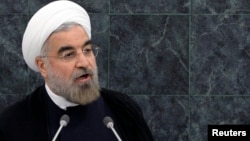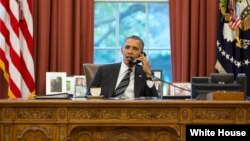ISTANBUL —
Iranian President Hassan Rouhani may have made a favorable impression on many in the West during his visit to the United Nations last week, but some of his country’s hardline military leaders were not at all pleased with the trip.
The way they see it, Rouhani should have refused to talk by telephone with U.S. President Barack Obama on the last day of his stay in the United States.
In an interview with an Iranian news-site, General Mohammad Ali Jafari, the head of Iran’s powerful Revolutionary Guards, said it was a “tactical error” for Rouhani to have spoken with the U.S. president.
“If we see errors being made by officials, the revolutionary forces will issue the necessary warnings,” Jafari said.
The military chief argued that until Washington lifts economic sanctions on Iran and accepts Tehran’s nuclear program, there should be no contact between the country’s two leaders.
The intervention of the Revolutionary Guards’ commander underscores the internal challenges Rouhani faces in trying to reach agreement with the West over Iran’s nuclear program.
West worried by Iranian nuclear program
Iran’s pursuit of nuclear technology has long worried the West, which accuses Iran of wanting to develop nuclear weapons. Iran insists its nuclear program is for civil purposes only -- a point Rouhani stressed repeatedly in public and private meetings in New York last week. The U.S. and Israel have also threatened military action to prevent the Islamic republic from obtaining nuclear weapons.
With the West’s economic sanctions squeezing Iran, Rouhani has made solving the nuclear standoff with West a key goal.
Jafari’s condemnation of the phone conversation with Obama comes after both Rouhani and Iran’s overall leader, Ayatollah Ali Khamenei, called on the Revolutionary Guards to stay out of politics. Members of the Revolutionary Guards consider themselves the guardians of the values of Iran’s 1979 revolution.
But according to Jafari, Rouhani, who was in New York for the U.N. General Assembly, was right to have avoided meeting Obama face-to-face, but was wrong to have accepted the September 27 phone call from U.S. president.
“Just as he refused to meet Obama, he should also have refused to speak with him on the telephone and should have waited for concrete action by the United States,” Jafari told Tasnimnews.com. U.S. officials had harbored hopes that two would briefly meet in New York and there was speculation of an “historic handshake.”
Last week’s phone call between Obama and Rouhani – it lasted about 15 minutes -- was the first direct contact between top-level leaders of the two countries since the 1979 Islamic revolution. Relations between the two nations were severed that year after Iranian revolutionaries seized 52 U.S. diplomats and held them captive for more than a year.
Rouhani told the state-run Mehr news agency that his brief conversation with Obama “was mainly about the nuclear issue.” He added: “I told him this program is not only the right of Iranians but also their pride and the U.S. president acknowledged this.”
Jafari says the United States should respond to Rouhani’s gesture of good will in New York by “lifting all sanctions against the Iranian nation, releasing Iranian assets frozen in the United States, ending its hostility toward Iran and accepting Iran’s nuclear program.”
Eggs and shoes
When Rouhani returned home over the weekend, he was greeted by about 300 supporters at Tehran’s Mehrabad airport who applauded his outreach to the United States.
But several dozen hard-liners also turned up to protest with ritual chants of “Death to America.” They also pelted Rouhani’s car with eggs and shoes and held up signs reading, “Negotiations with the Great Satan at what price?”
Some of the protesters were from the Basij militia, a volunteer force commanded by the Revolutionary Guards.
Jafari wasn’t alone in his criticizing the Iranian president. The commander of the Guards air wing, General Amir-Ali Hadjizadeh, told the IRG’s own sepahnews.com website that “U.S. hostility can’t be forgotten with a phone call and a smile.”
Despite the critics, analysts believe Rouhani maintains the crucial support of Khamenei, the supreme leader.
“A decision has been taken by the Iranian establishment to move in the direction of dialogue with the U.S.,” Mahjoob Zweiri, a professor of Middle East politics at Qatar University in Doha, told Bloomberg News.
A reflection of that is Rouhani has received praise generally for his New York trip from Tehran-based newspapers and state television.
“Currently most of influential political players of Iran are co-operating with Rouhani -- or at least are silent,” Iranian journalist and political analyst Mojaba Mousavi told VOA. “Everyone is waiting to see what his diplomacy will bring.”
But Mousavi warns that the U.S. government needs to be responsive to Rouhani’s overtures.
“It is now up to the American government to take its step to show it is honest in the process,” Mousavi said. “Ordinary people in Iran expect to see from the talks an ending of economic sanctions. If future negotiations fail to reach fair and acceptable results, it will be the best excuse for those political players in Tehran who are against any rapprochement with the U.S.”
Formal talks on Iran’s nuclear program will start in mid-October. At the weekend, Iranian Foreign Minister Mohammad Javad Zarif indicated he is cautiously optimistic a deal can be achieved. That view is shared by U.S. Secretary of State John Kerry, who says he hopes progress can be made quickly.
In Tehran, though, Zarif’s deputy, Abbas Araghchi, appeared to be trying to assure hardline factions that Iran will remain cautious in its dealings with Washington.
“A history of high tensions between Tehran and Washington will not go back to normal relations due to a phone call, meeting or negotiation,” the Iranian Fars news agency quoted him as saying. “We never trust America 100 percent.”
The way they see it, Rouhani should have refused to talk by telephone with U.S. President Barack Obama on the last day of his stay in the United States.
In an interview with an Iranian news-site, General Mohammad Ali Jafari, the head of Iran’s powerful Revolutionary Guards, said it was a “tactical error” for Rouhani to have spoken with the U.S. president.
“If we see errors being made by officials, the revolutionary forces will issue the necessary warnings,” Jafari said.
The military chief argued that until Washington lifts economic sanctions on Iran and accepts Tehran’s nuclear program, there should be no contact between the country’s two leaders.
The intervention of the Revolutionary Guards’ commander underscores the internal challenges Rouhani faces in trying to reach agreement with the West over Iran’s nuclear program.
West worried by Iranian nuclear program
Iran’s pursuit of nuclear technology has long worried the West, which accuses Iran of wanting to develop nuclear weapons. Iran insists its nuclear program is for civil purposes only -- a point Rouhani stressed repeatedly in public and private meetings in New York last week. The U.S. and Israel have also threatened military action to prevent the Islamic republic from obtaining nuclear weapons.
With the West’s economic sanctions squeezing Iran, Rouhani has made solving the nuclear standoff with West a key goal.
Jafari’s condemnation of the phone conversation with Obama comes after both Rouhani and Iran’s overall leader, Ayatollah Ali Khamenei, called on the Revolutionary Guards to stay out of politics. Members of the Revolutionary Guards consider themselves the guardians of the values of Iran’s 1979 revolution.
But according to Jafari, Rouhani, who was in New York for the U.N. General Assembly, was right to have avoided meeting Obama face-to-face, but was wrong to have accepted the September 27 phone call from U.S. president.
“Just as he refused to meet Obama, he should also have refused to speak with him on the telephone and should have waited for concrete action by the United States,” Jafari told Tasnimnews.com. U.S. officials had harbored hopes that two would briefly meet in New York and there was speculation of an “historic handshake.”
Last week’s phone call between Obama and Rouhani – it lasted about 15 minutes -- was the first direct contact between top-level leaders of the two countries since the 1979 Islamic revolution. Relations between the two nations were severed that year after Iranian revolutionaries seized 52 U.S. diplomats and held them captive for more than a year.
Rouhani told the state-run Mehr news agency that his brief conversation with Obama “was mainly about the nuclear issue.” He added: “I told him this program is not only the right of Iranians but also their pride and the U.S. president acknowledged this.”
Jafari says the United States should respond to Rouhani’s gesture of good will in New York by “lifting all sanctions against the Iranian nation, releasing Iranian assets frozen in the United States, ending its hostility toward Iran and accepting Iran’s nuclear program.”
Eggs and shoes
When Rouhani returned home over the weekend, he was greeted by about 300 supporters at Tehran’s Mehrabad airport who applauded his outreach to the United States.
But several dozen hard-liners also turned up to protest with ritual chants of “Death to America.” They also pelted Rouhani’s car with eggs and shoes and held up signs reading, “Negotiations with the Great Satan at what price?”
Some of the protesters were from the Basij militia, a volunteer force commanded by the Revolutionary Guards.
Jafari wasn’t alone in his criticizing the Iranian president. The commander of the Guards air wing, General Amir-Ali Hadjizadeh, told the IRG’s own sepahnews.com website that “U.S. hostility can’t be forgotten with a phone call and a smile.”
Despite the critics, analysts believe Rouhani maintains the crucial support of Khamenei, the supreme leader.
“A decision has been taken by the Iranian establishment to move in the direction of dialogue with the U.S.,” Mahjoob Zweiri, a professor of Middle East politics at Qatar University in Doha, told Bloomberg News.
A reflection of that is Rouhani has received praise generally for his New York trip from Tehran-based newspapers and state television.
“Currently most of influential political players of Iran are co-operating with Rouhani -- or at least are silent,” Iranian journalist and political analyst Mojaba Mousavi told VOA. “Everyone is waiting to see what his diplomacy will bring.”
But Mousavi warns that the U.S. government needs to be responsive to Rouhani’s overtures.
“It is now up to the American government to take its step to show it is honest in the process,” Mousavi said. “Ordinary people in Iran expect to see from the talks an ending of economic sanctions. If future negotiations fail to reach fair and acceptable results, it will be the best excuse for those political players in Tehran who are against any rapprochement with the U.S.”
Formal talks on Iran’s nuclear program will start in mid-October. At the weekend, Iranian Foreign Minister Mohammad Javad Zarif indicated he is cautiously optimistic a deal can be achieved. That view is shared by U.S. Secretary of State John Kerry, who says he hopes progress can be made quickly.
In Tehran, though, Zarif’s deputy, Abbas Araghchi, appeared to be trying to assure hardline factions that Iran will remain cautious in its dealings with Washington.
“A history of high tensions between Tehran and Washington will not go back to normal relations due to a phone call, meeting or negotiation,” the Iranian Fars news agency quoted him as saying. “We never trust America 100 percent.”


